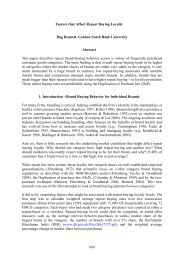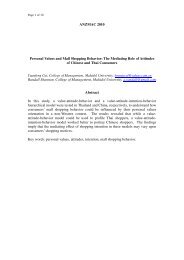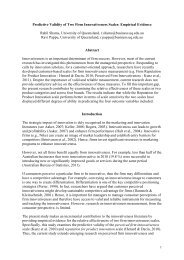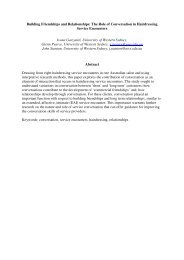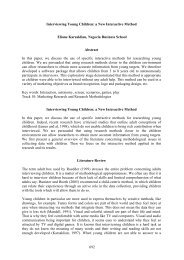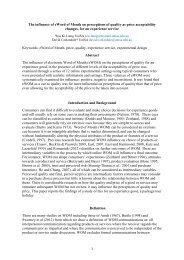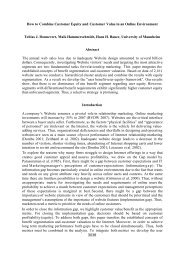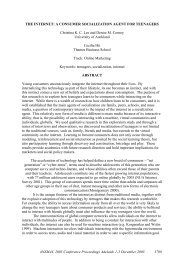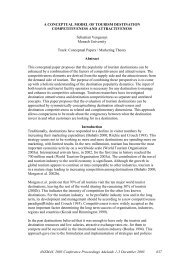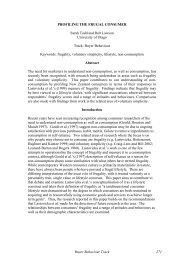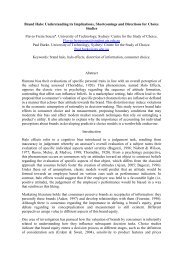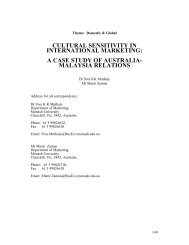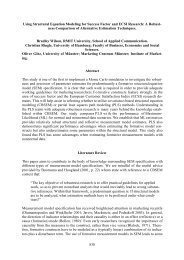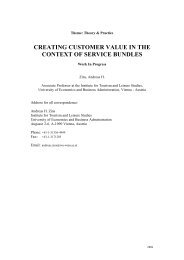improving the potential to forecast demand for wine by ... - ANZMAC
improving the potential to forecast demand for wine by ... - ANZMAC
improving the potential to forecast demand for wine by ... - ANZMAC
Create successful ePaper yourself
Turn your PDF publications into a flip-book with our unique Google optimized e-Paper software.
Testing <strong>for</strong> validity<br />
This study will compare alcohol consumption of all types because <strong>the</strong> data exists <strong>for</strong><br />
all alcohol consumption in 1994/5 and <strong>the</strong> 1998 study of alcohol consumption of <strong>the</strong><br />
Australian population, conducted <strong>by</strong> <strong>the</strong> ABS. Consequently, a higher level of<br />
validity will be possible as beer, spirits and o<strong>the</strong>r alcohols can be used <strong>to</strong> add validity<br />
<strong>to</strong> <strong>the</strong> data on <strong>wine</strong> consumption.<br />
The results from this study will compare each respondent’s <strong>wine</strong> consumption habits<br />
in 1994/5 and 1998. These periods represent <strong>the</strong> Australian Bureau of Statistics’<br />
(ABS) few studies in<strong>to</strong> <strong>the</strong> <strong>wine</strong> consumption habits of <strong>the</strong> Australian population. By<br />
comparing <strong>the</strong> respondents’ reported types of alcohol consumed over <strong>the</strong>se periods<br />
with <strong>the</strong> data provided <strong>by</strong> <strong>the</strong> ABS on alcohol consumption patterns, a level of<br />
validity can be attributed <strong>to</strong> <strong>the</strong> consumer’s capacity <strong>to</strong> recall <strong>the</strong>ir alcohol<br />
consumption patterns.<br />
Generating Empirical Data on Wine Consumption<br />
The difficulty <strong>for</strong> investigating previous alcohol consumption habits is in accurately<br />
obtaining <strong>the</strong> data from consumers. His<strong>to</strong>rically, it was believed that earlier<br />
consumption habits could not be researched because of a consumer’s inability <strong>to</strong><br />
accurately record <strong>the</strong>ir type or level of consumption in prior periods. (Parfitt 1967).<br />
However, Parfitt also found that respondents were able <strong>to</strong> recall <strong>the</strong>ir behaviour more<br />
reliably when <strong>the</strong> behaviour was a regular event.<br />
This is a problem <strong>for</strong> researching retrospectively, but <strong>the</strong> authors below have shown<br />
that consumers cannot only recall <strong>the</strong>ir alcohol consumption his<strong>to</strong>rically, if <strong>the</strong><br />
method of surveying is appropriate <strong>for</strong> <strong>the</strong> study, <strong>the</strong>re is <strong>the</strong> <strong>potential</strong> <strong>to</strong> record<br />
accurate data.<br />
Reporting Wine Consumption<br />
Early authors on reporting alcohol consumption purport that a respondent’s answers<br />
lack reliability. However, studies <strong>by</strong> Sobell, Hil<strong>to</strong>n, Giovannucci and o<strong>the</strong>rs have<br />
indicated that <strong>the</strong> consumer can recall <strong>the</strong>ir alcohol consumption from previous<br />
periods with a high degree of accuracy (Sobell et al. 1988; Hil<strong>to</strong>n 1989; Giovannucci<br />
et al. 1991). These studies utilised different methods of surveying a respondent’s<br />
recall, and over varying durations of time, with similar results.<br />
Sobell and o<strong>the</strong>rs found that consumers can recall <strong>the</strong>ir alcohol consumption over<br />
specific periods of time, when <strong>the</strong> consumer is prompted <strong>to</strong> recall <strong>the</strong>ir consumption<br />
over subsequent days of <strong>the</strong> week, from <strong>the</strong> start of <strong>the</strong> study. This method is referred<br />
<strong>to</strong> as <strong>the</strong> ‘Timeline’ method, and is reliable when <strong>the</strong> consumer is given time <strong>to</strong> recall<br />
<strong>the</strong>ir alcohol consumption from day-<strong>to</strong>-day over <strong>the</strong> life of <strong>the</strong> study (Sobell et al.<br />
1988).<br />
Hil<strong>to</strong>n also found that a consumer’s prompted recall method and diary recording can<br />
both be effective ways of investigating a consumer’s alcohol consumption patterns<br />
(Hil<strong>to</strong>n 1989). Hil<strong>to</strong>n highlighted a number of researchers who have had varying<br />
<strong>ANZMAC</strong> 2003 Conference Proceedings Adelaide 1-3 December 2003 691



